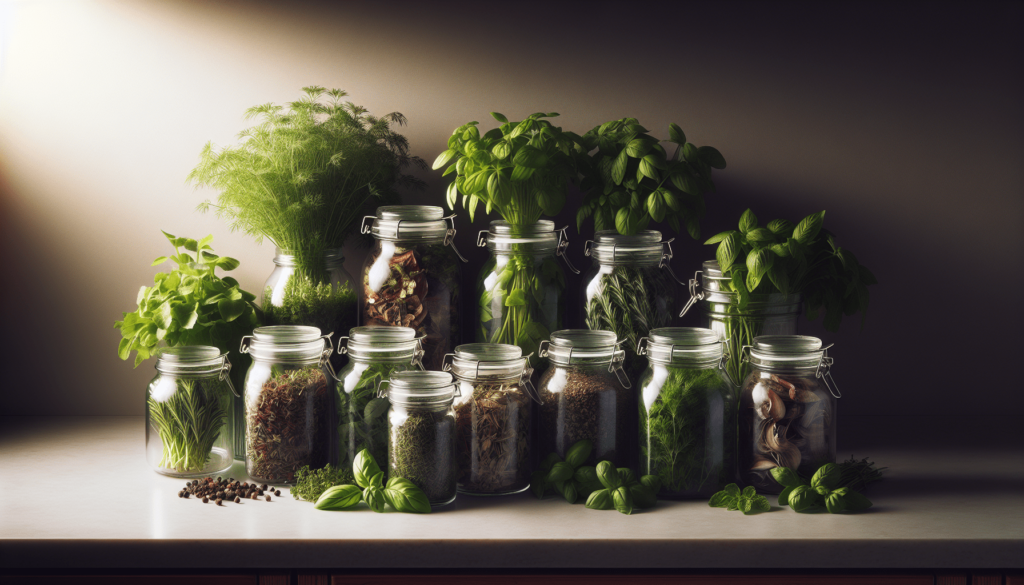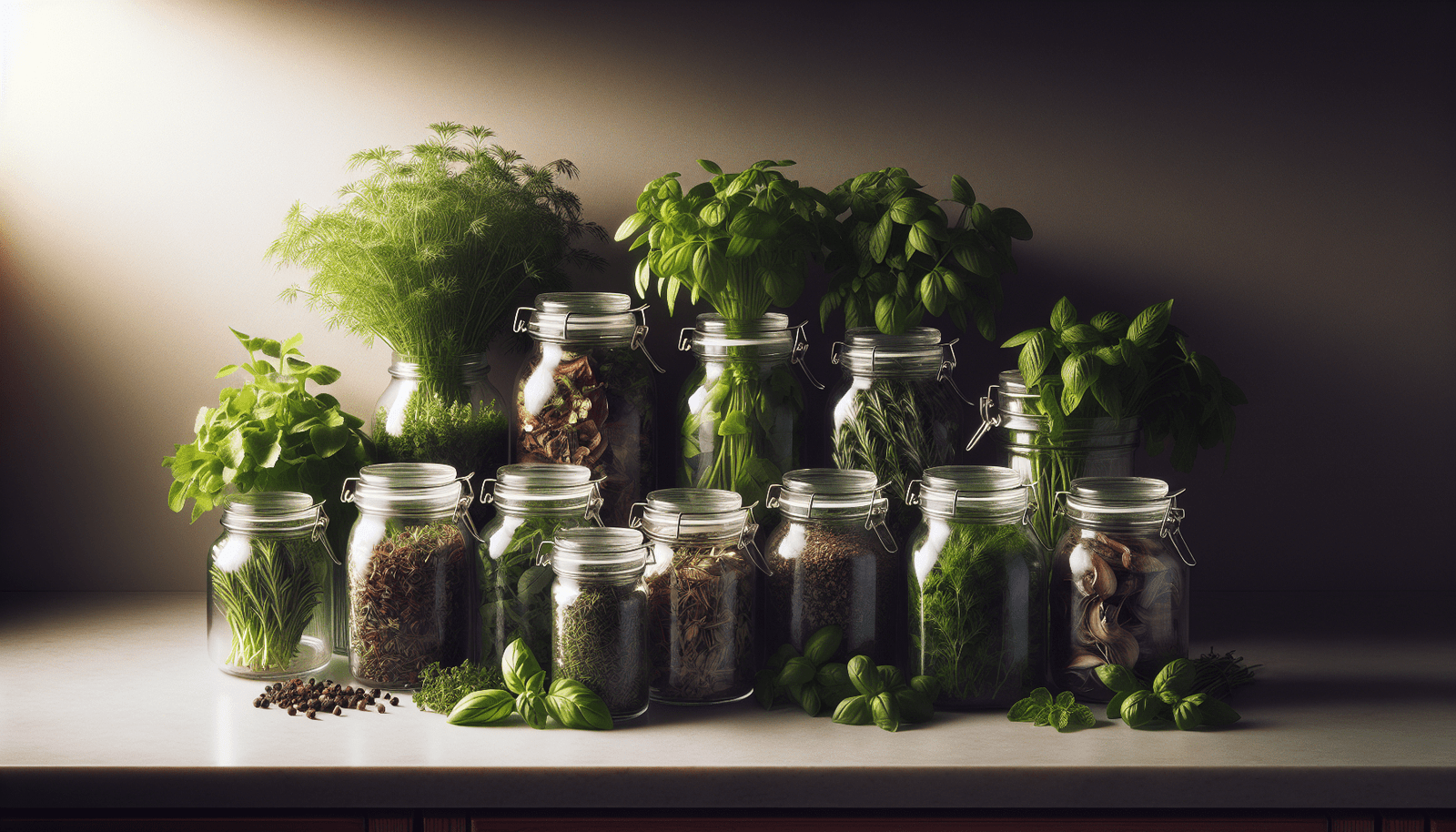What’s The Best Way To Store Fresh Herbs?
We’ve all been there—excitedly picking up a bunch of fresh herbs from the store or harvesting some from your garden, only to have them wilt and lose their flavor within days. But fear not, because with the right storage methods, you can keep your herbs fresh and delicious for much longer. In this article, we’ll explore the best ways to store fresh herbs to make the most out of their flavor and shelf life.

Why is Proper Storage Important for Fresh Herbs?
Before we dive into the specifics of how to store fresh herbs, let’s first understand why proper storage is essential. Fresh herbs are delicate and can quickly lose their flavor, aroma, and nutritional benefits if not stored correctly. Exposure to air, moisture, and sunlight can cause herbs to wilt, dry out, or even rot. By storing them properly, you can prolong their freshness, enhance their flavor, and ensure they’re ready to use when you need them.
Preventing Herb Wilt
When fresh herbs are not stored correctly, they can wilt and lose their vibrant color and flavor. Proper storage helps prevent this by maintaining the herbs’ moisture content and preventing them from drying out too quickly. By following the right storage methods, you can keep your herbs looking fresh and tasting delicious for longer periods.
The Best Way to Store Fresh Herbs
Now that we understand why proper storage is crucial let’s look at the best ways to store fresh herbs:
Refrigerator Storage
One of the most common methods for storing fresh herbs is in the refrigerator. Here’s a simple step-by-step guide to storing herbs in the refrigerator:
- Wash the herbs: Rinse the herbs under cold water to remove any dirt, debris, or pesticides. Gently pat them dry with a paper towel or clean kitchen towel.
- Trim the stems: Trim the ends of the herb stems to remove any damaged or wilted parts.
- Wrap in a damp paper towel: Place the herbs in a damp paper towel and roll them up gently. This helps retain moisture and prevent wilting.
- Store in a plastic bag: Place the wrapped herbs in a plastic bag with holes or a perforated vegetable storage bag.
- Refrigerate: Store the bag of herbs in the refrigerator’s crisper drawer or in the main compartment. Some herbs, like basil and cilantro, can be stored in a glass of water, much like fresh flowers.
This method helps maintain the herbs’ freshness and prolongs their shelf life by providing them with the right amount of moisture and protection from air exposure.
Freezing Herbs
Another effective way to store fresh herbs for a more extended period is by freezing them. Freezing herbs is a great option when you have an abundance of herbs that you want to preserve for future use. Here’s how you can freeze fresh herbs:
- Wash and dry the herbs: Clean the herbs thoroughly and pat them dry with a paper towel to remove excess moisture.
- Chop or leave whole: Depending on your preference, you can chop the herbs into smaller pieces or leave them whole.
- Flash-freeze: Spread the chopped herbs on a baking sheet lined with parchment paper and place them in the freezer for a couple of hours. This prevents the herbs from sticking together.
- Transfer to storage container: Once the herbs are frozen, transfer them to an airtight container or resealable plastic bag.
- Label and date: Don’t forget to label the container with the herb type and freezing date for easier identification.
By freezing fresh herbs, you can preserve their flavor and nutrients for months, allowing you to enjoy them in your dishes all year round.
Herb Infused Oils
If you want to infuse the flavor of fresh herbs into your dishes, herb-infused oils are a fantastic option. Making herb-infused oils is a simple process that involves steeping fresh herbs in oil to extract their flavors. Here’s how you can make herb-infused oils at home:
- Clean and dry the herbs: Wash the herbs thoroughly and pat them dry to remove excess moisture.
- Combine herbs and oil: Place the clean herbs in a sterilized glass jar and cover them with your choice of oil (e.g., olive oil, sunflower oil, or grapeseed oil).
- Infuse: Seal the jar and place it in a cool, dark place for a couple of weeks to allow the herbs to infuse their flavors into the oil.
- Strain: After infusing, strain out the herbs from the oil using a fine-mesh strainer or cheesecloth.
- Store: Transfer the infused oil into a clean, airtight jar or bottle and store it in a cool, dark place or in the refrigerator.
Herb-infused oils are excellent for adding flavor to dressings, marinades, and cooked dishes, offering a convenient way to enjoy the taste of fresh herbs in your cooking.
Herb Butter
Herb butter is another delicious way to store and enjoy fresh herbs. Herb butter is simply butter blended with chopped herbs, creating a flavorful spread that can be used in various dishes. Here’s how you can make herb butter:
- Soften the butter: Allow the butter to come to room temperature until softened.
- Chop the herbs: Finely chop your desired herbs, such as parsley, chives, dill, or cilantro.
- Mix the butter and herbs: In a mixing bowl, combine the softened butter and chopped herbs. Add a pinch of salt and pepper if desired.
- Blend well: Mix the butter and herbs until well combined, ensuring an even distribution of flavors.
- Shape and store: Shape the herb butter into a log using plastic wrap or parchment paper and refrigerate until firm.
Herb butter can be used to enhance the flavor of grilled meats, roasted vegetables, pasta, or simply spread on bread for a tasty treat.
Herb Salt
Herb salt is a versatile seasoning blend that combines fresh herbs with salt, creating a flavorful condiment that can be used in various dishes. Here’s how you can make herb salt at home:
- Wash and dry the herbs: Clean the herbs thoroughly and pat them dry to remove excess moisture.
- Chop the herbs: Finely chop the herbs of your choice, such as rosemary, thyme, sage, or oregano.
- Mix with salt: Combine the chopped herbs with salt in a ratio of approximately 1:3 (herbs to salt). You can adjust the ratio based on your preference.
- Blend well: Mix the herbs and salt until well combined, ensuring an even distribution of flavors.
- Store: Transfer the herb salt into an airtight container and store it in a cool, dark place.
Herb salt can be used as a seasoning for meats, vegetables, salads, soups, and more, adding a burst of fresh herb flavor to your dishes.
Herb Vinegar
Herb vinegar is a delightful way to store fresh herbs while infusing their flavors into vinegar. Herb vinegar can be used in dressings, marinades, sauces, or as a flavor enhancer in various dishes. Here’s how you can make herb vinegar at home:
- Clean and dry the herbs: Wash the herbs thoroughly and pat them dry to remove excess moisture.
- Place in a sterilized jar: Place the clean herbs in a sterilized glass jar, leaving some space at the top.
- Heat vinegar: Heat vinegar (e.g., white wine vinegar, apple cider vinegar, or rice vinegar) in a saucepan until warm but not boiling.
- Pour over herbs: Pour the warm vinegar over the herbs in the jar, ensuring they are fully covered.
- Seal the jar: Seal the jar tightly and store it in a cool, dark place for a couple of weeks to allow the flavors to infuse.
- Strain and store: After infusing, strain out the herbs from the vinegar and transfer the herb-infused vinegar into a clean, airtight bottle for storage.
Herb vinegar adds a tangy, herbaceous kick to your dishes, elevating their flavor with the essence of fresh herbs.
Conclusion
Proper storage of fresh herbs is crucial to maintaining their flavor, aroma, and nutritional benefits for an extended period. Whether you choose to store herbs in the refrigerator, freeze them, make herb-infused oils, herb butter, herb salt, or herb vinegar, there are plenty of creative and delicious ways to enjoy fresh herbs in your cooking. By following the storage methods outlined in this article, you can make the most out of your fresh herbs and elevate your culinary creations with their vibrant flavors and aromas. So the next time you bring home a bunch of fresh herbs, remember these storage tips to keep them fresh, flavorful, and ready to use whenever you cook up a storm in the kitchen.
